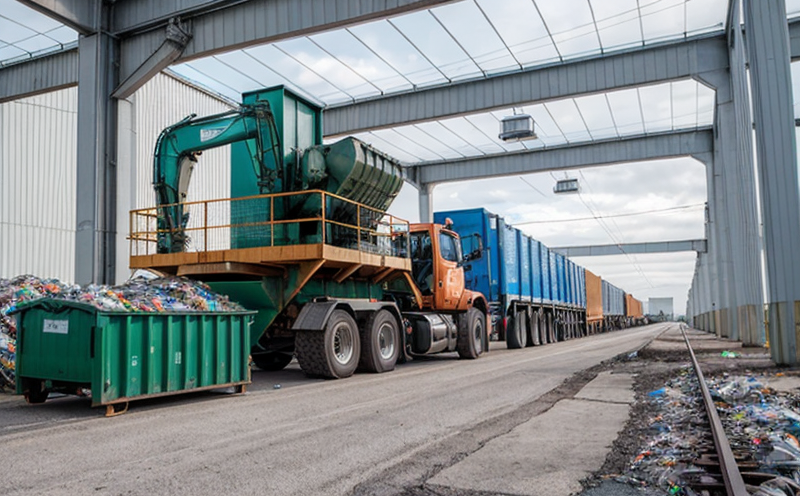ASTM D8184 Automotive Component Recycling Testing
The ASTM D8184 standard is pivotal in ensuring that automotive components are recycled and reused in a manner that aligns with sustainable practices. This test method provides a standardized approach to evaluating the recyclability of automotive components, focusing on their potential for resource recovery and reuse.
Automotive recycling is essential for reducing waste and conserving valuable materials such as metals, plastics, and rubber. By following ASTM D8184, manufacturers can ensure that recycled components meet stringent quality standards, thereby enhancing the overall performance and reliability of new products derived from recycled content.
The test method involves several key steps: initial assessment of the component's composition, disassembly into its constituent parts, characterization of these materials, and finally, evaluation of their suitability for recycling. This process ensures that only components with high recyclability potential are selected for reuse, thus minimizing environmental impact.
ASTM D8184 addresses the critical issue of material compatibility in automotive recycling processes. It helps identify which components can be effectively recycled without compromising product integrity or safety. By adhering to this standard, industries can contribute significantly to the circular economy by promoting sustainable manufacturing practices.
The application of ASTM D8184 is not limited to just one area; it encompasses multiple stages of the recycling process. From initial design considerations to final disposal and recovery, this test method plays a crucial role in ensuring that every step aligns with sustainability goals. This holistic approach ensures that automotive components are designed for disassembly and subsequent recycling.
One of the key advantages of ASTM D8184 is its ability to provide clear guidelines on how to assess recyclability. It offers detailed protocols for sample preparation, testing procedures, data analysis, and reporting results. These comprehensive instructions help laboratories and quality assurance teams consistently produce accurate and reliable test outcomes.
Another important aspect of ASTM D8184 is its emphasis on continuous improvement in recycling processes. By regularly updating the criteria based on new technologies and materials, this standard ensures that automotive component recyclability remains relevant and effective over time. This adaptability makes ASTM D8184 a valuable tool for both current and future challenges in sustainable manufacturing.
| Application Area | Description |
|---|---|
| Automotive Manufacturing | Evaluation of recycled materials for use in new automotive products. |
| Sustainable Procurement | Determining the environmental impact of purchased components. |
| Research and Development | Testing novel materials for potential inclusion in future products. |
- Identifying high-priority components for recycling.
- Optimizing resource recovery processes through material characterization.
- Evaluating the durability and performance of recycled materials in automotive applications.
- Ensuring compliance with international standards on sustainable practices.
Why It Matters
The implementation of ASTM D8184 is crucial for several reasons, particularly in the context of industrial manufacturing and processing. Recycled automotive components not only reduce waste but also conserve natural resources by minimizing the need for virgin materials. This practice contributes significantly to environmental sustainability.
By adhering to this standard, companies can enhance their reputation as responsible corporate citizens. Consumers increasingly prefer products from environmentally friendly sources, making compliance with ASTM D8184 a strategic advantage in today’s market. Moreover, meeting these standards helps businesses comply with regulatory requirements and avoid potential penalties.
The use of recycled materials also has economic benefits. It reduces raw material costs and can lead to cost savings throughout the supply chain. Additionally, recycling supports local economies by creating jobs in waste management and processing industries.
ASTM D8184 plays a vital role in fostering innovation within the automotive sector. By providing clear guidelines on recyclability, it encourages manufacturers to explore new materials and technologies that can be effectively recycled. This forward-thinking approach ensures that the industry remains at the forefront of sustainable practices.
Industry Applications
| Application Area | Description |
|---|---|
| Automotive Manufacturing | Evaluation of recycled materials for use in new automotive products. |
| Sustainable Procurement | Determining the environmental impact of purchased components. |
| Research and Development | Testing novel materials for potential inclusion in future products. |
- Identifying high-priority components for recycling.
- Optimizing resource recovery processes through material characterization.
- Evaluating the durability and performance of recycled materials in automotive applications.
- Ensuring compliance with international standards on sustainable practices.
Customer Impact and Satisfaction
By leveraging ASTM D8184, customers can expect high-quality, reliable results that meet stringent industry standards. This ensures they receive accurate information about the recyclability of automotive components, which is crucial for making informed decisions.
Our testing services not only provide peace of mind but also enhance customer satisfaction by offering a transparent and consistent approach to quality assurance. Compliance with ASTM D8184 helps build trust between manufacturers and their suppliers, fostering long-term relationships based on mutual respect and shared sustainability goals.
We understand that every customer has unique needs, which is why we tailor our testing services to meet individual requirements. Whether you need basic compliance checks or comprehensive evaluations of complex materials, we have the expertise and resources to deliver accurate and timely results.
Our commitment to excellence extends beyond just meeting standards; it includes providing detailed reports that explain the test procedures, data analysis methods, and final conclusions. This transparency allows customers to fully understand the basis for our findings, enabling them to make well-informed decisions.





